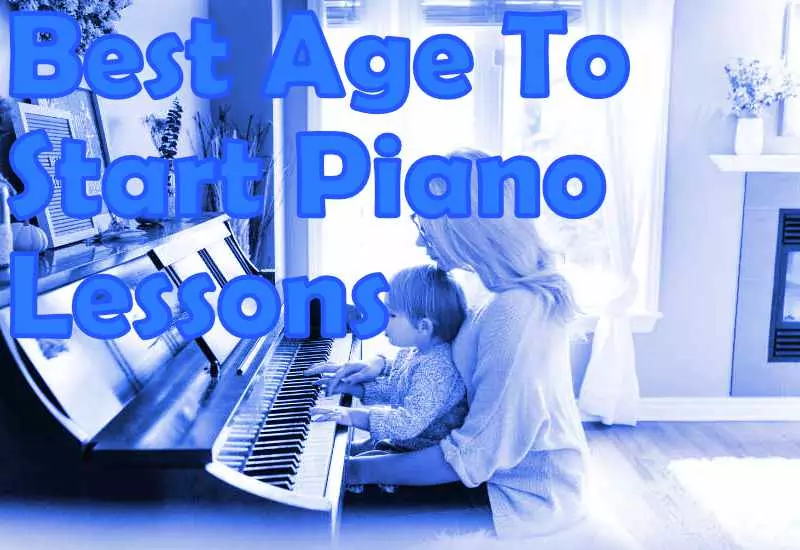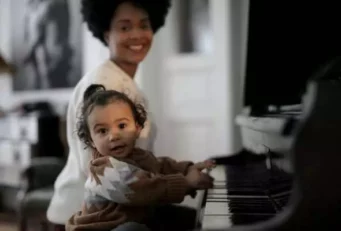Best Age to Start Piano Lessons

Contents
- 1 So, At What Age Should Your Child Start Piano Lessons?
- 2 Build a Strong Foundation for Young Pianists
- 3 But Is It Ever Too Late to Start Piano Lessons? What If Your Kid Is Already a Teenager?
- 4 Tips When Starting to Play the Piano
- 4.0.1 Place the piano in a busy part of your house.
- 4.0.2 Always make sure that the piano stool is the correct height for your child.
- 4.0.3 Focus on your child’s accuracy and not their speed.
- 4.0.4 Always keep the piano or keyboard in tune.
- 4.0.5 Ensure that your child has good practice habits.
- 4.0.6 Let them play in front of their friends, grandparents, uncles, aunts and cousins.
- 4.0.7 Don’t force them to learn.
What is the Best Age to Start Piano Lessons?
A lot of kids get drawn to the piano at a young age. It makes different sounds, it is easy to play and explore, plus it’s fun! Many parents wonder at what age to start piano lessons and when to start piano lessons to become a good pianist.
Music expression helps children grow and develop fully-rounded and balanced lives. Learning how to play a musical instrument like the piano and keyboard helps the mind develop functions like abstract reasoning skills. It also teaches a kid to create, store and recover memories more effectively. People who play an instrument have an outlet for their emotions and creativity.
In this article, we will explore the best age to start piano lessons and tips that will make your child’s piano journey a lot easier.
Related: Please read up on how to teach kids piano.
So, At What Age Should Your Child Start Piano Lessons?

Photo by Andrea Piacquadio
According to studies, the best age to start your child’s piano lessons is between the ages of 6 and 9 years old[1]. It’s best to start them at a young age to make them familiar and acquainted with the sounds, keys, and notes of a piano or keyboard. In fact, the famous Mozart learned to play the piano at a young age of 3!
According to The Absorbent Mind, at age six, a child’s brain is like a sponge. Her brain soaks up a lot of information from her surroundings, she gravitates on learning things like music, sounds, early math, letters, shapes, reading and writing. A child’s control, movement, balance and basic physical mechanisms are also being developed at this age.
Build a Strong Foundation for Young Pianists
Taking the short route is never the way to go. Building a strong foundation for young pianists is beneficial in the long run. The first few years of piano lessons can be filled with excitement, wonder, growth and music making. The basic skills and concepts taught at a young age lay the foundation for success and advancement of a pianist.
A student may be talented and bright, loves and appreciates music, able to understand concepts quickly, but will they be good pianists if they don’t practice consistently, if they don’t have a strong foundation? Teaching and establishing good practicing habits is one of the key factors to a solid and strong piano foundation. The practice sessions should be filled with discovery and excitement, not monotonous and tiring. Students must find real joy while learning new concepts and piano pieces so they will be able to grasp concepts better, memorize piano keys by heart and become a pianist that touches peoples’ souls.
A kid’s first experience with piano lessons will most likely remain with them for a long period of time. It’s important to choose a piano school that will not force them to learn, but teach them how to find real joy while playing the piano. If they don’t have a good experience in their first piano lesson, they may not have progress and they will probably lose interest in playing the piano. So, having an engaging and positive learning environment is the right way to go!
But Is It Ever Too Late to Start Piano Lessons? What If Your Kid Is Already a Teenager?
Of course not! It is never too late for anyone to start taking piano lessons. While there are advantages to children starting at a young age, that does not mean that anyone older than 9 will not be able to learn how to play the piano. With hard work, determination, passion and parental support, you’re already one step closer to becoming a good pianist! So do not ever lose hope and start taking piano lessons now!
Tips When Starting to Play the Piano
When starting piano lessons, it’s important to know and try out tips that will make your child’s piano journey easier, enjoyable and successful. Without further ado, here are the best tips to aid your child:
-
Place the piano in a busy part of your house.
It will remind your child to practice playing and it will be convenient for them to use it in the living room, playroom, or their bedroom.
-
Always make sure that the piano stool is the correct height for your child.
Your child should be able to play comfortably. The stool must be set according to your child’s height so they will not develop some poor technique.
-
Focus on your child’s accuracy and not their speed.
Let them practice slowly in the beginning, you should not rush their learning. They will not be able to learn properly if they only focus on their speed.
-
Always keep the piano or keyboard in tune.
Pianos must be tuned regularly to keep your child motivated and inspired to play and learn.
-
Ensure that your child has good practice habits.
Having bad habits can discourage your child from learning. Good practice habits will help them be more motivated and inspired.
-
Let them play in front of their friends, grandparents, uncles, aunts and cousins.
But of course, do not force your child to play if they don’t want to. Only make them practice if they agree.
-
Don’t force them to learn.
Help them find the real joy in playing the piano.
Parents, Teachers & Sheet Music Seekers:
If I offered to provide you hundreds of legit sheet music PDFs for your kids:
- Brand-New & Exclusive Compositions
- Age & Level Appropriate
- With INSTANT Online Access
- Worry-FREE Licensing & Copyright
...would you take me up on that offer?
ABOUT
I started Music4Kids with a simple goal in mind: To provide valuable information to guiding parents who want to raise musically inclined kids.
Click to read on